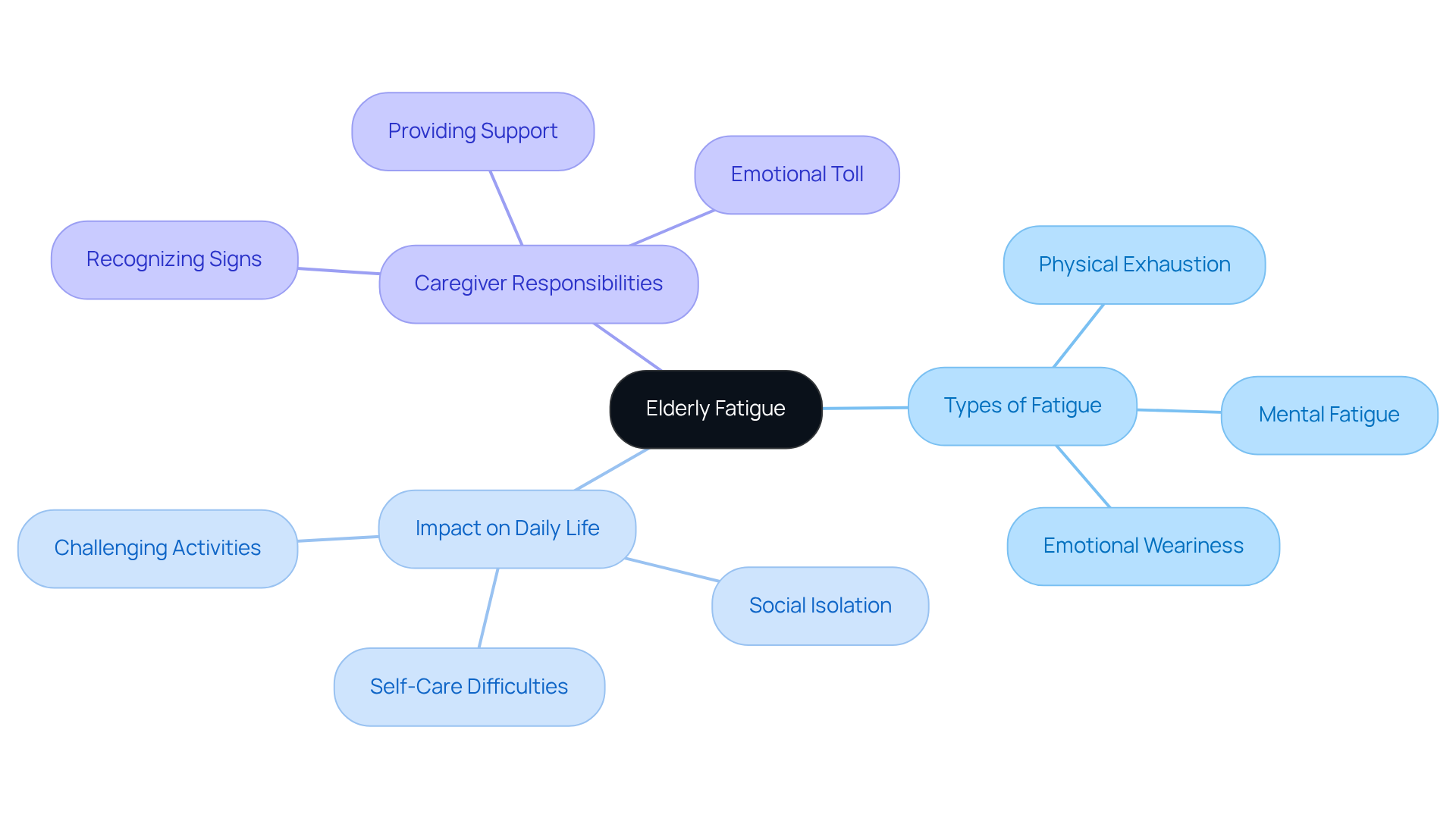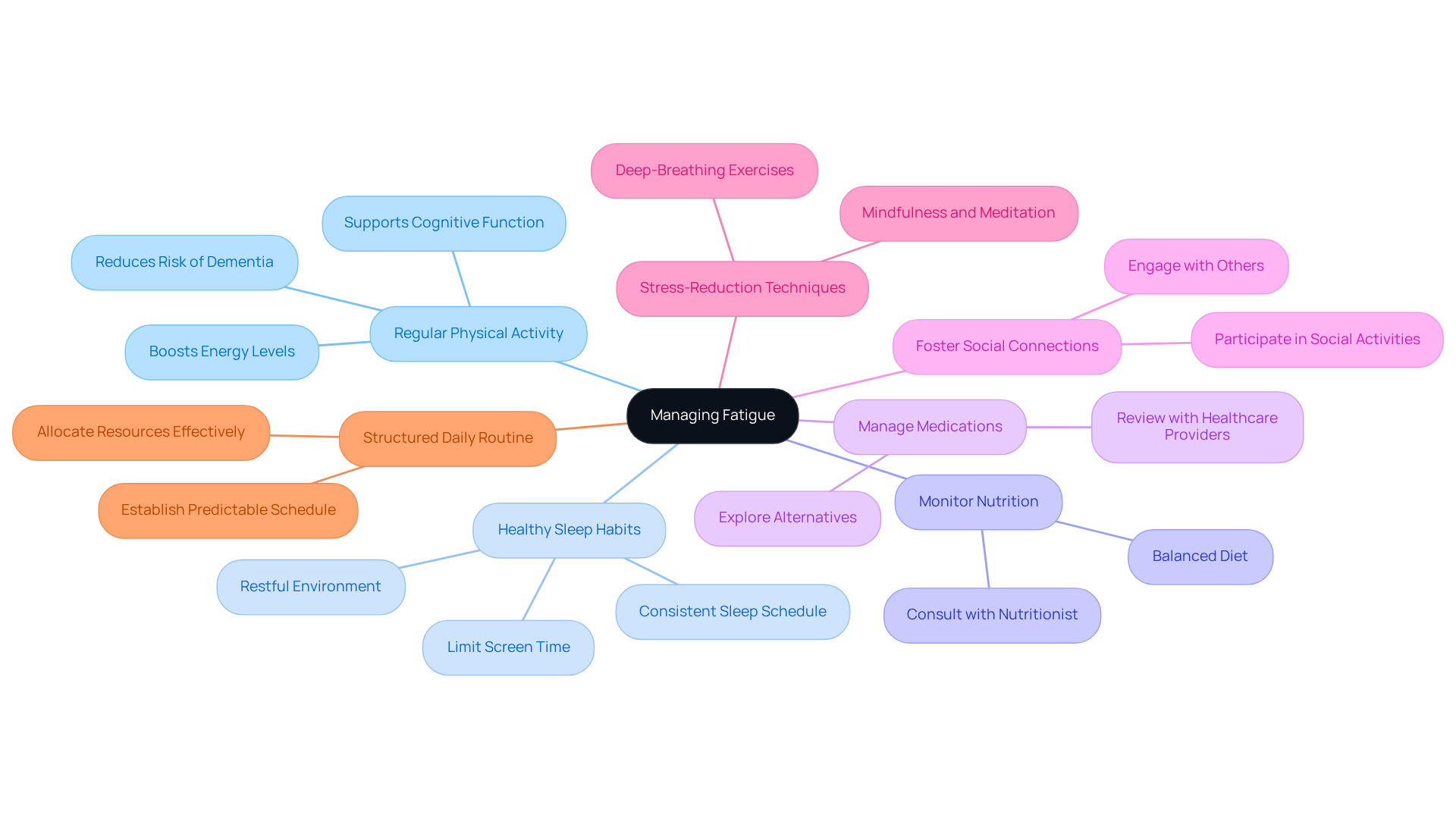Overview
Elderly fatigue can feel overwhelming, leaving individuals with a persistent sense of tiredness that deeply affects their daily lives. This fatigue makes even simple activities challenging, and it can lead to a decline in health and overall quality of life.
Understanding the causes of this fatigue is crucial. Chronic health conditions, certain medications, sleep disorders, and social isolation can all contribute to this exhausting experience. It’s important to recognize these factors, as they can amplify feelings of stress and burnout for both the elderly and their caregivers.
But there is hope. Management strategies can make a significant difference. Regular physical activity, monitoring nutrition, and fostering social connections are vital steps that can help mitigate this fatigue. These strategies not only support physical health but also nurture emotional well-being.
Imagine the joy of engaging in a light walk with a friend or sharing a meal with loved ones. These moments can bring warmth and connection, reminding us that we are not alone in this journey.
As we navigate these challenges together, let’s focus on the support available. There are compassionate services designed to help both the elderly and their caregivers find balance and relief. Remember, you are not alone in this. Together, we can foster a nurturing environment that promotes health and happiness.
Introduction
Elderly fatigue is more than just feeling tired; it’s a widespread issue that deeply affects the daily lives of older adults. This condition can show up as physical, mental, and emotional exhaustion, often taking away the joy from activities they once loved and reducing social interactions.
Understanding the many causes of this fatigue—from chronic health conditions and medication side effects to sleep disorders and nutritional deficiencies—provides caregivers with a crucial opportunity to improve the quality of life for their loved ones.
But here’s the challenge: how can caregivers effectively tackle this exhausting fatigue while also nurturing emotional well-being and fostering social connections?
It’s a tough road, filled with stress and burnout, but know that you’re not alone. There are compassionate solutions available to help you and your loved ones navigate this journey together.
Define Elderly Fatigue and Its Impact on Daily Life
Elderly exhaustion is more than just tiredness; it’s a persistent feeling of fatigue that doesn’t fade away with rest. This condition can show up in many ways—physical exhaustion, mental fatigue, and emotional weariness. For older adults, this can make daily life feel overwhelming. Activities they once loved may become too challenging, social connections might dwindle, and even basic self-care tasks can feel like a mountain to climb.
Recognizing the signs of exhaustion is vital for caregivers. It’s not just about noticing fatigue; it’s about understanding that this can lead to a decline in health, increased dependency, and a lower quality of life. Caregivers often feel the weight of this responsibility, and it’s important to acknowledge the emotional toll it can take on them as well.
By grasping the implications of fatigue, caregivers can find ways to support their loved ones more effectively. Whether it’s through seeking help, sharing experiences, or simply being there to listen, every little bit counts. Remember, you’re not alone in this journey. There are resources and communities ready to provide the emotional and practical support you need. Together, we can navigate these challenges and foster a nurturing environment for our loved ones.
Identify Common Causes of Fatigue in Older Adults
Various factors can contribute to elderly fatigue in seniors, affecting their energy levels and overall well-being. It’s important to recognize these challenges, as they can deeply affect both seniors and their caregivers.
-
Chronic Health Conditions: Many seniors, around 60%, face chronic health issues like heart disease, diabetes, and arthritis. These conditions can lead to ongoing elderly fatigue, as the body tirelessly manages these illnesses. Healthcare professionals often note that the effort required to manage these chronic conditions can be draining.
-
Medications: The reality is that many older adults take multiple medications for their chronic conditions. Unfortunately, some of these can cause side effects that contribute to elderly fatigue. Sedatives, antihistamines, and certain pain relievers are common culprits, often inducing drowsiness. A healthcare provider emphasizes the importance of understanding these side effects to manage tiredness effectively.
-
Sleep Disorders: Sleep disturbances are all too common among seniors. Studies show that nearly 50% experience issues like insomnia, sleep apnea, or restless leg syndrome. These disorders disrupt sleep patterns, which results in significant elderly fatigue during the day. Addressing sleep disorders is crucial for improving energy levels and overall quality of life.
-
Mental Health Issues: Depression and anxiety affect about 15% of older adults. These mental health challenges can significantly contribute to elderly fatigue. It’s essential to address emotional well-being alongside physical health. As one caregiver shared, recognizing the emotional aspects of chronic illness can lead to better support for loved ones.
-
Nutritional Deficiencies: A balanced diet is vital for sustaining energy. Many seniors may not get enough essential nutrients, like iron and vitamin D, which can result in elderly fatigue. A nutritionist recommends that maintaining a balanced diet is key to fighting tiredness and enhancing vitality.
-
Sedentary Lifestyle: A lack of physical activity can weaken muscles and reduce stamina. Studies indicate that seniors who engage in regular exercise report higher energy levels. In contrast, those who experience elderly fatigue often find even simple tasks exhausting. Community activities can provide motivation for physical activity, which is so important.
Social isolation can result in elderly fatigue, as loneliness may lead to emotional exhaustion and worsen physical tiredness. Engaging in social activities is crucial for maintaining both mental and physical health. A caregiver’s experience highlights how nurturing relationships within the community can greatly enhance the emotional health of seniors.
By understanding these causes, caregivers can better address the underlying issues. This understanding fosters improved health outcomes and enhances the quality of life for their loved ones. Remember, you’re not alone in this journey; support is available, and together, we can navigate these challenges.
Implement Effective Strategies to Manage Fatigue
Caring for older adults can be a challenging journey, especially when fatigue sets in. As caregivers, it’s essential to recognize the emotional toll this can take on both you and your loved ones. Here are some compassionate strategies to help manage fatigue and enhance the quality of life for older adults:
-
Encourage Regular Physical Activity: Gentle exercises like walking, stretching, or yoga can work wonders in boosting energy levels and overall health. The CDC recommends at least 150 minutes of moderate-intensity exercise each week. This not only helps fight tiredness but also supports cognitive function and reduces the risk of conditions like dementia, all while improving sleep quality.
-
Promote Healthy Sleep Habits: A consistent sleep schedule, a restful environment, and limiting screen time before bed are vital for better sleep quality. Research shows that regular physical activity can also enhance sleep, leading to more vitality during the day.
-
Monitor Nutrition: A balanced diet filled with fruits, vegetables, whole grains, and lean proteins is key to maintaining energy. Consulting with a nutritionist can provide personalized dietary recommendations that uplift overall wellness and combat tiredness.
-
Manage Medications: Regularly reviewing medications with healthcare providers can help identify any that might contribute to fatigue. Exploring alternatives can lead to improved energy and well-being.
-
Foster Social Connections: Encouraging participation in social activities, whether in-person or virtual, can help alleviate loneliness and emotional exhaustion. Engaging with others has been shown to boost mental well-being and vitality in older adults.
-
Implement Stress-Reduction Techniques: Mindfulness, meditation, or deep-breathing exercises can significantly reduce mental fatigue and enhance overall well-being. These practices are effective in managing stress, which often contributes to feelings of tiredness.
-
Create a Structured Daily Routine: Establishing a predictable schedule can help manage energy levels and reduce feelings of overwhelm. A well-organized day allows seniors to allocate their resources more effectively.
By embracing these strategies, you can help older adults regain their energy and improve their overall quality of life. Remember, regular physical activity is particularly important, as it not only reduces the risk of conditions like dementia but also enhances sleep quality. Together, we can make a meaningful difference in their lives.
Conclusion
Elderly fatigue is more than just feeling tired; it’s a complex issue that touches on the physical, mental, and emotional well-being of older adults. For caregivers, understanding this condition is crucial. It can deeply affect daily life and overall quality of life. By recognizing the signs and implications of fatigue, caregivers can offer more effective support, creating a nurturing environment that fosters connection and understanding.
Several key contributors to elderly fatigue deserve attention:
- Chronic health conditions
- Medication side effects
- Sleep disorders
- Mental health issues
- Nutritional deficiencies
- Sedentary lifestyle
Each of these factors can lead to a cycle of exhaustion that drains the vitality of older adults. By addressing these root causes—whether it’s promoting physical activity, ensuring proper nutrition, or enhancing social connections—caregivers can help uplift the energy levels and well-being of their loved ones.
In conclusion, managing elderly fatigue is a journey that requires compassion, awareness, and proactive strategies. By implementing effective interventions and nurturing supportive relationships, caregivers can significantly enhance the quality of life for older adults. Embracing this journey together not only alleviates fatigue but also enriches the emotional and social fabric of their lives, ensuring they remain engaged and vibrant members of the community.
Frequently Asked Questions
What is elderly fatigue?
Elderly fatigue is a persistent feeling of exhaustion that does not improve with rest, manifesting as physical exhaustion, mental fatigue, and emotional weariness.
How does elderly fatigue affect daily life?
It can make daily activities feel overwhelming, leading to challenges in engaging in previously enjoyed activities, diminished social connections, and difficulties with basic self-care tasks.
Why is it important for caregivers to recognize signs of elderly fatigue?
Recognizing the signs is crucial because it can lead to a decline in health, increased dependency, and a lower quality of life for older adults.
What emotional toll can elderly fatigue take on caregivers?
Caregivers may feel the weight of responsibility for their loved ones, which can lead to emotional strain and stress.
How can caregivers support elderly individuals experiencing fatigue?
Caregivers can support their loved ones by seeking help, sharing experiences, and providing emotional support through listening and being present.
Are there resources available for caregivers dealing with elderly fatigue?
Yes, there are resources and communities available that offer emotional and practical support for caregivers navigating the challenges of elderly fatigue.




